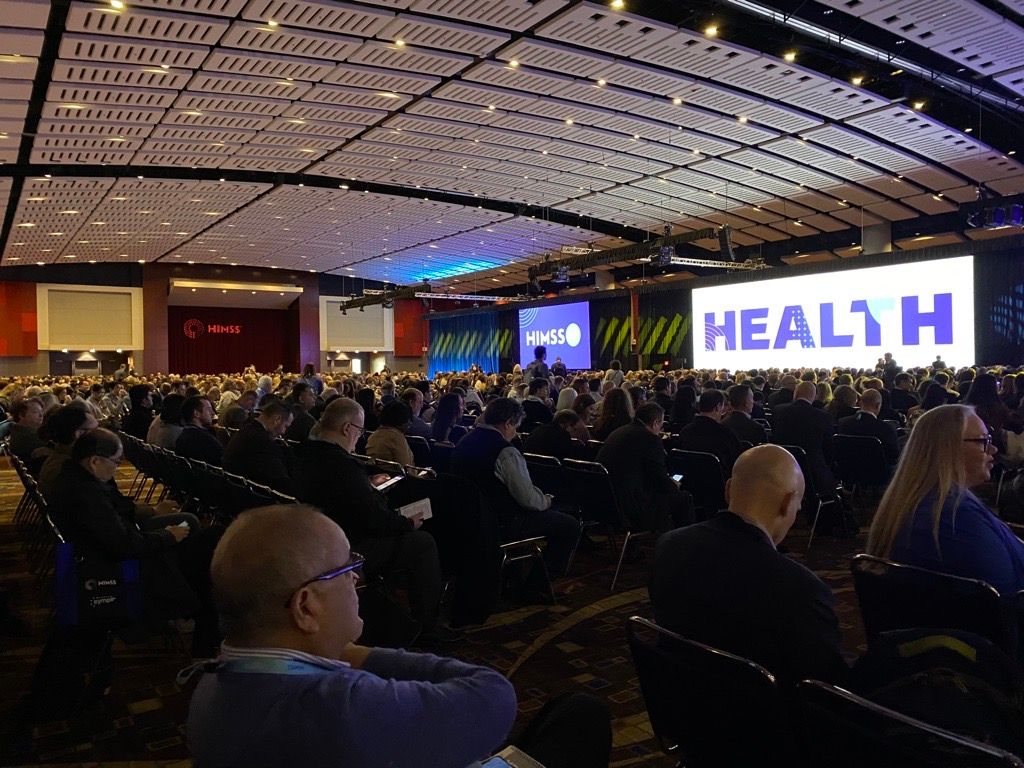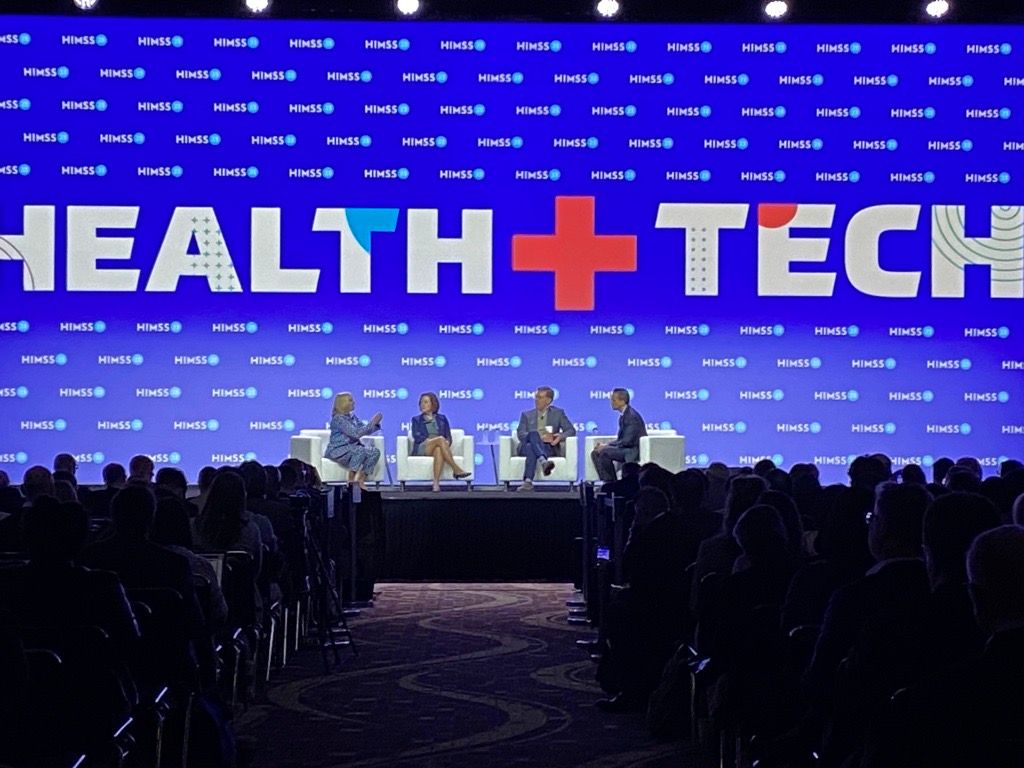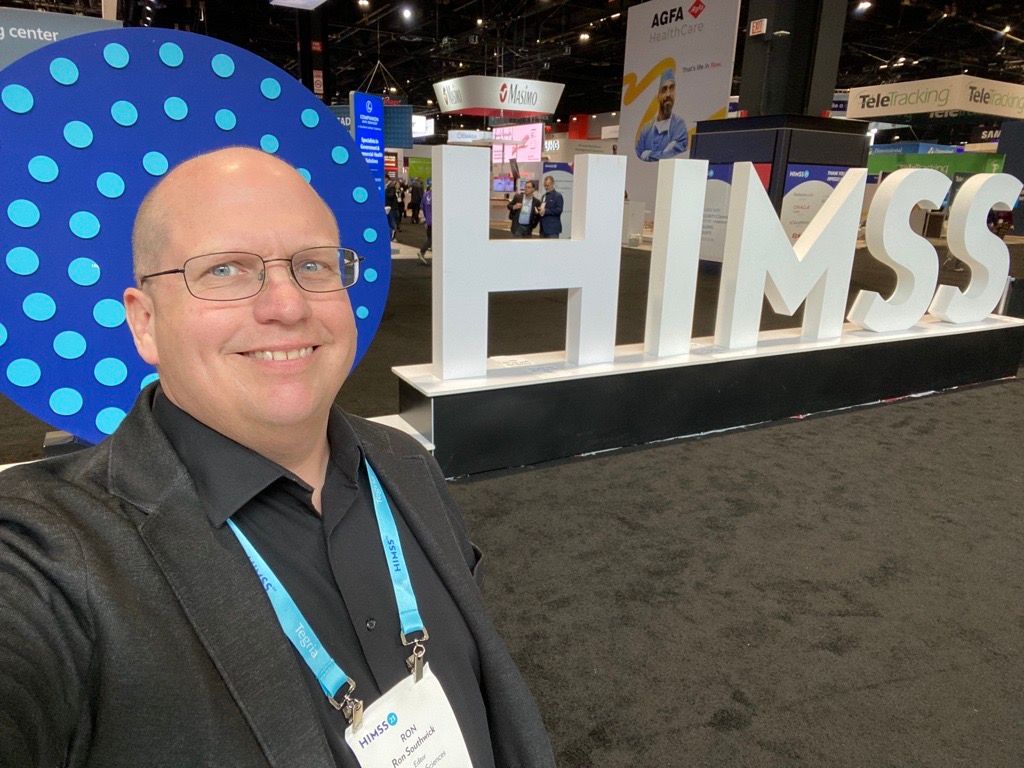Highlights from HIMSS: AI and other hot topics
Artificial intelligence dominated the health technology conference, but it wasn’t the only fascinating topic of discussion.
Chicago – Apparently, healthcare professionals are ready to meet in person again.
About 35,000 people attended the HIMSS Global Health Conference & Exhibition. (Photo: Ron Southwick)

About 35,000 people came to the HIMSS Global Health Conference & Exhibition, Hal Wolf, president and CEO of HIMSS, said at a media briefing Wednesday.
The conference featured hundreds of panel discussions, and until HIMSS adds a cloning booth to the event, it’s not possible to catch them all live. But there are some takeaways from the many panels I managed to catch, as well as interviews and quick conversations with the many healthcare leaders in attendance.
AI
One of those in attendance posted on Twitter that the HIMSS Conference could be summed up in two letters, and actually, it could be done with two vowels.
The conference was dominated by discussions of AI. Artificial intelligence wasn’t the only topic at the conference by any means, although it felt that way a couple of times. Plenty of healthcare pros acknowledged they’re using, and enjoying, ChatGPT.
Panelists discuss artificial intelligence during the HIMSS Global Health Conference & Exhibition. (Photo: Ron Southwick)

But the conference offered a great deal of thoughtful conversation about AI, its promise and the recognition of the potential hazards as AI plays a bigger role in healthcare. Microsoft and Epic announced a partnership to bring generative AI into electronic health records.
Peter Lee, corporate vice president of research and incubation at Microsoft, said it well in a keynote panel discussion on the future of AI in healthcare.
“There are tremendous opportunities here,” he said. “But there are also significant risks, and risks we probably don't even know about yet.”
Experts say AI could help better identify patients at risk of risk of cancer or stroke, or help researchers with their work. The risks include AI using algorithms tainted by racial bias.
Healthcare leaders heard a common message at HIMSS: Get up to speed on AI and help guide how it should be used.
Cybersecurity
Plenty of sessions at HIMSS focused on cybersecurity, which has been a huge concern for healthcare leaders. And not all the news was dire.
Cybersecurity experts noted a recent drop in ransomware attacks. And they noted that hospitals and health systems have made real progress in bolstering their defenses.
But there are some concerns. Cybersecurity experts warn attackers could be regrouping and assessing other ways to launch attacks. Plus, health systems are struggling to recruit and retain skilled cybersecurity professionals, who can make more money in other industries.
And AI looks to play a growing role in cybersecurity. Experts say ransomware groups will be using AI-powered malware to attack health systems in the near future. But they also pointed out that AI-powered cybersecurity tools offer the potential to defend against attacks.
Health equity
Many hospital leaders have cited health equity as one of their top priorities, and it was a recurring theme in many sessions, including discussions of the use of AI.
Health leaders say they have fears that AI could exacerbate disparities in access to care. Kay Firth-Butterfield, chief executive officer of the Centre for Trustworthy Technology, noted that three billion people worldwide don’t have access to the internet.
Health leaders urged the many leaders of tech companies designing digital health solutions to include health equity in the development of their products.
Health leaders from dozens of countries attended the HIMSS Global Health Conference & Exhibition. (Photo: Ron Southwick)

Patients want more
Many at HIMSS said they recognize that many Americans aren’t happy at all with the healthcare system. They note it’s too difficult for consumers to navigate, and too costly for far too many Americans.
Tim Barry is the CEO, co-founder and board chairman of VillageMD, said he was worried about the tech leaders developing tools and devices that are designed to serve a “failed” health system.
“At the end of the day, we’re not meeting the needs consumers have,” Barry said during a keynote address.
Barry was hardly the only healthcare leader at HIMSS to offer that assessment. Leaders and health leaders say the system must do better, in terms of convenience, affordability and accessibility. And they say patients are willing to go with providers who offer a better experience.
Another recurring point: Patients are looking for more options to get treated at home.
Clinicians need more
Doctors and nurses say they are struggling with burnout, and health leaders routinely cite the mental health of their staff as one of their biggest challenges. Tech companies at HIMSS were touting a large number of solutions aimed at shifting some administrative workers from clinicians so they could “practice at the top of their license” (a phrase that was used early and often at the conference).
Tech developers were urged to make sure their solutions are designed with clinical workflows in mind, and to get clinicians involved with the development of their projects. Plenty of leaders mentioned that highly touted digital solutions in the past have not only fallen short in reducing headaches but have actually added to their workload.
Another point: A few health leaders pointed out that if systems adopt tools that do remove some administrative burdens, they could make a mistake if they force clinicians to see a bunch of additional patients. Patients want more time with doctors.
The lightning round
Here are some final quick notes, thoughts, and musings.
Thanks to the many healthcare leaders who shared their thoughts at the HIMSS Global Health Conference & Exhibition. (Photo: Ron Southwick)

-A number of leaders talked about the need to include serving rural patients in discussions of health equity. That seems to be a growing concern. Many rural hospitals are struggling to keep their doors open.
-After spending so much of the COVID-19 pandemic addressing crisis after crisis, hospital and healthcare executives seem to be engaging in more long-term planning. They’re asking questions and looking at where their organizations need to change and adapt.
-HIMSS made a few efforts on sustainability. Attendee badges didn’t have plastic covers. And HIMSS opted against placing carpet through much of the exhibition space, since Wolf said carpet at conventions is typically used once and discarded.
-Next year’s conference will take place March 11-14 in Orlando, Florida. In 2025, the conference moves to Las Vegas.
-For a convention of its size, the WiFi was surprisingly good, at least for this user. Granted, it is a healthcare technology conference, but it was still welcome.
-I’d like to express my thanks to the many healthcare leaders who were so generous with their time and shared their thoughts with me in interviews throughout the HIMSS Conference. I left HIMSS with plenty of stories and story ideas in the weeks and months to come. Shameless plug alert: Keep coming back to Chief Healthcare Executive® for more stories, podcasts and content looking at the transformation of healthcare.
Children’s hospitals face complex challenges dealing with disasters
April 18th 2025Pediatric hospitals deal with different factors in weather-related events and other emergencies. Terri Wilson of the Children’s Hospital Association talks about the challenges and the need for more planning and support.
Telehealth faces a looming deadline in Washington | Healthy Bottom Line podcast
February 12th 2025Once again, the clock is ticking on waivers for telemedicine and hospital-at-home programs. Kyle Zebley of the American Telemedicine Association talks about the push on Congress and the White House.